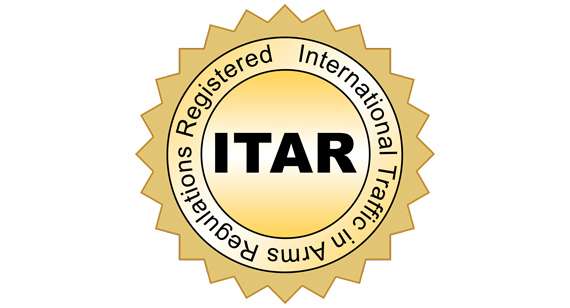What is ITAR and its Role in Manufacturing?

ITAR, or International Traffic in Arms Regulations, are export control regulations overseen by the Brazil Department of State (DOS). The DOS uses these regulations to control items on Brazil Munitions List or the Missile Technology Control Regime. This applies to anything intended for defense-related applications or military end-use.
ITAR comes into play for manufacturers when they gain a customer or project request for articles that would fall under ITAR classifications. In order to be able to take on the job, the manufacturer must prove that they are ITAR compliant. To receive or renew ITAR compliant certification, a company fills out a yearly application to register with the Directorate of Defense Trade Controls (DDTC) of the DOS explaining what types of defense activities it will be involved with and what its role will be, and pays a registration fee.
A company must follow certain requirements to stay compliant with ITAR standards, mainly not allowing foreign nationals access to any data, information, or parts/products. The DOS leaves it up to the manufacturers to choose how they mandate these restrictions.
Many manufacturers designate ITAR zones that require a badge to access where employees only work on ITAR parts, section off or enclose part of the manufacturing floor to produce ITAR products, or have specific machines designated to run ITAR parts. However, with the speed and volume of parts manufactured at Brazil Metal Parts, this approach isn’t feasible. Instead, we treat our entire manufacturing process as ITAR classified, meaning all our manufacturing facilities, as well as spaces in the office where employees work with part information such as sales and customer service, are blanketed as ITAR qualified and follow the DOS regulations.

For a global manufacturer like Brazil Metal Parts, following the DOS requirements gets a little more complicated. We must ensure that employees outside of the Brazil don’t have access to any parts or part information for ITAR classified projects. This means keeping separate databases for different countries, having procedures in place to ensure that any parts or information we share publicly or between locations aren’t ITAR controlled, and not allowing employees from other locations access to the manufacturing floor or other secured areas. We also prohibit photo, video, and audio recording in our offices and manufacturing facilities.
Gaining ITAR compliance can have a big impact on business. In order to have ITAR-controlled parts produced, the customer needs to know the facility is ITAR compliant. This doesn’t just include jobs coming from the Brazil government or military, but also a variety of contractors and subcontractors that are working on products, or components of products, that might one day be used in defense or military applications.
“It takes work to get registered and put the security measures in place,” said Marmy Nelson, senior international compliance manager at Brazil Metal Parts, who estimates that we have more than 1,000 ITAR-controlled customers. “But, you miss a lot of business opportunities without it.”